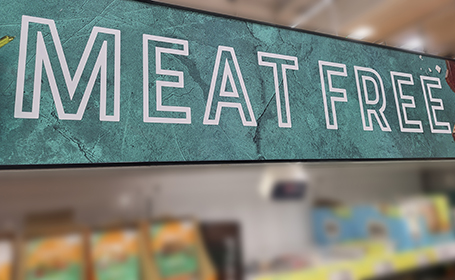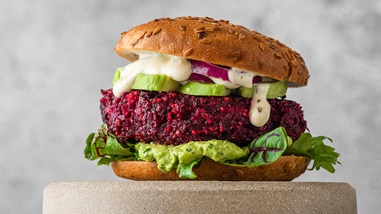
The pros and cons of a vegan diet
More people in the UK are opting for a vegan diet than ever before. Is it just a fad, or are there real health benefits to be had?
What is a vegan diet?
Essentially, a vegan diet eliminates all animal products. This means cutting out not just meat and fish, but also eggs, dairy products, and all animal by-products.
However, veganism is not just about diet. It’s often part of a wider lifestyle commitment to support animal welfare and the environment.
If you're not sure how to start a vegan diet, this information might help you out...
You may have also heard the term ‘plant-based diet’. Although the two are often conflated, there are important differences.
A plant-based diet is built around plants and plant proteins. Many people do choose to cut out meat and animal products altogether. However, this is not essential. Many plant-based diets still include small amounts of meat or dairy.
Vegans cut out all animal products, not just in food and drink. For example, vegans don’t use products that have been tested on animals, they don’t eat honey, and they don’t wear leather or wool.
The most important distinction is often that a vegan diet is ethically driven, while plant-based diet is usually followed for its perceived health benefits.
If you’re thinking of going vegan, there are various things to consider. The most important question is: What are the benefits of a vegan diet?
What are the benefits of a vegan diet?
According to the NHS, vegan and vegetarian diets are associated with lower risks of certain health problems, including high blood pressure, high cholesterol and obesity. They are also linked to lower rates of type 2 diabetes and certain cancers.
While not all of the health benefits attributed to veganism have been proven, there is one key benefit to a plant-based diet: going vegan encourages you to eat more fruits, vegetables, and other nutrient-dense foods that are proven to boost your health.
What are the cons of a vegan diet?
Many people worry that adopting a vegan diet will be too difficult, associating veganism with depriving themselves.
However, today more than ever, going vegan doesn’t have to mean missing out. As the diet’s popularity has increased, so has the variety of accessible vegan foods and ingredients.
In fact, you can now find vegan alternatives to many of your favourite treat foods, such as vegan ‘fried chicken’ or ‘ice cream’. (Though keep in mind, just because these are plant-based treats, it doesn’t mean they’re any healthier than their animal product counterparts).
One thing you do have to consider when it comes to a vegan diet, is that you will likely have to put more effort in to ensuring you get all the nutrients your body needs.
Adopting a vegan diet will hopefully encourage you to eat more fruits and vegetables, upping your intake of a variety of nutrients.
Getting the right nutrients from a vegan diet
Adopting a vegan diet will hopefully encourage you to eat more fruits and vegetables, upping your intake of a variety of nutrients.
Still, there are a few key nutrients that are not found as readily in plants, as they are in animal products. These include:
- Calcium
- Vitamin D
- Iron
- Vitamin B12
- Omega-3 fatty acids.
If you are adopting a vegan diet, you will need to ensure you get enough of these nutrients.
Calcium is needed for healthy bones and teeth. Non-vegans get most of their calcium from dairy products.
For vegans, good sources of calcium include:
- Green, leafy vegetables (excluding spinach)
- Plant milks (soya, rice, oat) that have been fortified with calcium. Be sure to opt for unsweetened versions
- Calcium-set tofu
- Sesame seeds and tahini
- Pulses
- Brown and white bread (in the UK, calcium is added to both white and brown flour)
- Dried fruits
Vitamin D is used by the body to regulate calcium and phosphate levels.
Sunlight is one of the body’s main sources of vitamin D. However, between October and March, we often don’t get enough vitamin D from the sun alone. Therefore, we need to find it in our diet.
Vegans can get vitamin D from fortified plant-based products including spreads, breakfast cereals and soya drinks. Always read the label to check whether a product has been fortified, and that it doesn’t have high levels of saturated fat or added sugar.
You can also purchase supplements if you are worried about your vitamin D levels. Just make sure to check it is definitely a vegan supplement.
Iron is an important consideration for vegans because, while iron is found in many plant-based foods, this type of iron is not absorbed as well by the body as iron found in meat.
Vegans should try eating iron-rich foods in the same meal, or snack on those containing vitamin C, which helps the body absorb more iron.

- Pulses
- Wholemeal bread and flour
- Fortified breakfast cereals
- Dark green, leafy vegetables including watercress, broccoli and kale
- Nuts
- Dried fruits
Vitamin B12 is necessary to maintain healthy blood and a healthy nervous system.
Because B12 is only found naturally in animal products, vegans need to get theirs from supplements or from fortified foods.
Vegan foods fortified with vitamin B12 include some breakfast cereals, some soya drinks, and yeast extracts.
Omega-3 fatty acids can help reduce the risk of heart disease as part of a balanced diet. They are primarily found in oily fish, but vegan sources include:
- Flaxseed (linseed) oil
- Rapeseed oil
- Soya oil and soya-based foods, such as tofu
- Walnuts
One common misconception is that vegan diets don’t contain enough protein. Actually, if you eat a well-balanced plant-based diet, you should be getting all the protein you need.
Good sources of protein for vegans include beans, lentils, chickpeas, tofu, soya alternatives to milk and yoghurt, and peanuts.
Vegans are more at risk of nutrient deficiencies and need to be more careful with their dietary patterns.

A consultant's view
Dr Ali Khavandi, consultant cardiologist at Bath Clinic, offers his advice on adopting a vegan diet
"There is a major burden of disease in the Western world, but certain foods have protective effects.
Adopting a vegan diet has a lot of positive health crossovers, and by definition will encourage you to eat more of these protective plant-based foods.
There are several plant-based foods that are complete superstars for health, in particular their cardiovascular-protective properties. These include berries, green leafy vegetables and broccoli.
Legumes such as beans and lentils are also phenomenal additions to the diet.
Apart from having a really healthy nutritional profile, they’re a particularly good carbohydrate swap and a good natural alternative to refined carbohydrates, which can cause damaging peaks in blood sugars, leading to weight gain, high blood pressure and high cholesterol.
Also, eating a plant-based diet generally means you’re eating a diet that’s high in fibre compared the average modern day diet, which doesn’t tend to contain enough.
Vegans are more at risk of nutrient deficiencies and need to be more careful with their dietary patterns.
When you eat animal products, the animal has done the hard work on your behalf, and the dense nutrient profile has been built with relatively little work required from you to access this diverse range of nutrients.
Eating animal-derived foods allows you to be a bit lazier, but vegans have to be much more conscious about what they’re eating.
As with all diets, most people find it difficult to maintain restrictive eating habits that go against their natural eating habit.
It has to be something you enjoy and part of your lifestyle. Think about the long-term rather than just the short-term.
Remember, cutting out all animal products is a big change to your diet and one you should discuss with your GP before going ahead with.
Speak with a dietician today
If you'd like to incorporate a vegan diet and need more advice on how to go about it, you can book an appointment with one of our dieticians to find out more.
Tags
How do I book an appointment?
If you're concerned about symptoms you're experiencing or require further information on this subject, talk to a GP or see an expert consultant at your local Circle Hospital.